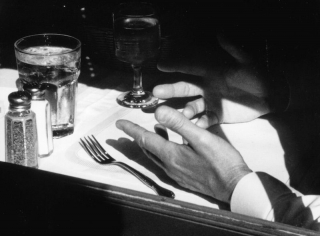In Between Moments
Date: 17 June 2003 | Season: California Sound/California Image
IN BETWEEN MOMENTS
Tuesday 17 June 2003, at 7pm
London Barbican Screen
Personal emotions and experiences are documented and disclosed in three intimate films of private moments. Luminous glances at everyday life and a sensitive affirmation of female sensuality.
Nathaniel Dorsky, Variations, 1992-98, colour, silent, 24 min (18fps)
Chick Strand, Soft Fiction, 1979, b/w, sound, 54 min
Warren Sonbert, Noblesse Oblige, 1981, colour, sound, 25 min
IN BETWEEN MOMENTS
Tuesday 17 June 2003, at 7pm
London Barbican Screen
VARIATIONS
Nathaniel Dorsky, 1992-98, colour, silent, 24 min (18fps)
“Variations shows us glimpses of the world through an infinite eye. We see the forms of the world in their beautiful material immediacy: a cigarette on the floor, the brightness of white geese in the water, a shadowy chess board, a dog intently waiting for its owner with an expression of pure desire. But beyond the immediacy, the abstract poetic connections between shots suggest commonality of form – everything has a form –and in this sense all things are united. But we can and do still enjoy the pleasure of the visual differences, a pleasure that is, in turn, enhanced by the existence of similarity. Our act of seeing and our realisation of a playful interchange between similarity and difference seem more vital to our viewing of Variations than the notion of either self-expression or personal projection.” —Sarah Markgraf and Gregg Biermann, Millennium Film Journal
“What tender chaos, what current of luminous rhymes might cinema reveal unbridled from the daytime word? During the Bronze Age a variety of sanctuaries were built for curative purposes. One of the principal activities was transformative sleep. This montage speaks to that tradition.” —Nathaniel Dorsky
SOFT FICTION
Chick Strand, 1979, b/w, sound, 54 min
“Chick Strand’s Soft Fiction is a personal documentary that brilliantly portrays the survival power of female sensuality. It combines the documentary approach with a sensuous lyrical expressionism. Strand focuses her camera on people talking about their own experience, capturing subtle nuances in facial expressions and gestures that are rarely seen in cinema. The title Soft Fiction works on several levels. It evokes the soft line between truth and fiction that characterises Strand’s own approach to documentary, and suggests the idea of soft-core fiction, which is appropriate to the film’s erotic content and style. It’s rare to find an erotic film with a female perspective dominating both the narrative discourse and the visual and audio rhythms with which the film is structured. Strand continues to celebrate in her brilliant, innovative personal documentaries her theme, the reaffirmation of the tough resilience of the human spirit.” —Marsha Kinder, Film Quarterly
NOBLESSE OBLIGE
Warren Sonbert, 1981, colour, sound, 25 min
“Because most of the shots in Noblesse Oblige last no more than several seconds, the elliptical linkage of these ritualistic images and the interspersing of numerous shots of city streets, subways, skyscrapers, ships, airplanes, bridges, oil derricks, trees, mountain tops, etc. cumulatively suggest a sort of visual democracy. And this visual democracy, apparent throughout Sonbert’s mature work, underscores the relativity of all perceptions. What distinguishes Noblesse Oblige from its predecessors is its juxtaposition of symbols of American democracy, such as the Washington Monument, the Capitol Building and the Lincoln Memorial, with images of angry rioters, disconsolate mourners, masses of demonstrators and television reporters. […] Part of the ‘submerged story’ of Noblesse Oblige traces the shock and grief of San Franciscans following the assassinations of Harvey Milk and George Moscone and the outrage of the city’s gay community in the wake of the assassin’s conviction for manslaughter rather than murder. The candlelight parade occurred just after the murders; the storming of City Hall by indignant protestors followed the jury’s decision; the reception hosted by Diane Feinstein took place after she replaced Moscone as Mayor.” —David Davidson, Millennium Film Journal
